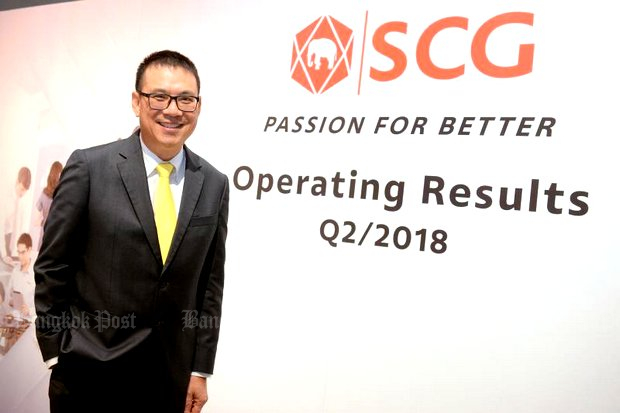
Siam Cement Group (SCG) is one of Thailand's oldest companies. Established in 1913 following a royal decree from King Vajiravudh to produce cement locally, it was the main building material for infrastructure projects in a bid to substitute import materials.
Despite over a century of experience, the company's management team has many concerns for the 2020s, in particular regarding digital disruption, new competition and a saturated local market.
SCG wants to become the strongest company in Southeast Asia, unveiling a new vision and management tools under the theme "Passion for Better".
Technology is everything
Led by SCG's president and chief executive Roongrote Rangsiyopash, the consumer generation is mobilised by Gen X (born during 1980-1997) and Gen Y (born after 1997), who engage in internet-based activities and social media.
"These changes are challenges all for business sectors, presenting both threats and opportunities," he said.
SCG has invested 3 billion baht in digital technology to support all business units as well as 1-2% of total annual revenue on innovation and technology.
SCG generated revenue of 482.45 billion baht last year.
Mr Roongrote added both technology and innovation are important tools to drive every business to sustainable growth in the long run.
"SCG plans to expand social infrastructures such as IT systems and innovation to adapt to customers' behaviour and increase more channels to meet new demand."
He said technological disruption is happening in all business sectors, including construction materials, impacting SCG's cement-building materials as well.
SCG must be prepared and adjust for this wave, said Mr Roongrote.
Huge impact on labour
Mr Roongrote said digital disruption will also challenge SCG's employees, and it has to be prepared to support roughly 50,000 staff amid these changes.
"They must change their mindset to accept the digital era and solve any problem in the workplace with the best solutions."
Earlier, SCG established corporate venture capital firm AddVenture to connect all SCG business units with innovation and technology and create new digital manpower.
"AddVenture has 10 startups under development, eight of which are in the country," Mr Roongrote said.
"From a budget of 3 billion baht, roughly 400 million baht has been spent on Thai startups."
Construction materials go online
In the past couple of years, most SCG customers have preferred to shop online through smartphones and computers instead of physically going to retailers.
Nithi Patarachoke, vice-president for the cement-building materials unit said SCG previously launched the SCG online store as an e-commerce and digital payment solution.
"Thanks to collaborations with several partners, SCG aims to add more products via the online platform, up to 1,000 stock keeping units [SKUs]," he said.
"We expects to reach 10,000 SKUs for sale on the website in the next few years."
SCG plans to encourage dealers to access and use the digital platform as they cannot avoid this fast-approaching trend and the demands of younger customers.
The cement-building materials unit has 400 dealers and 7,000 sub-dealers across Thailand.
Last year, the unit posted total revenue of 175 billion baht, up by 3% year-on-year and net profit for the period stood at 7.2 billion baht, down by 15%, a fall that was blamed on fierce market competition and a bearish domestic market.
Stronger logistics network
The movement to e-commerce platform has pushed SCG to transform and develop its own logistics and services system.
Mr Nithi said the logistics and services is the heart of the business as SCG must deliver its parcels as fast as possible.
"Once this business is strong enough, the logistics and services can be the fourth unit for SCG," he said.
SCG had three core business units: cement-building materials, packaging and petrochemicals.
Mr Nithi said the country's logistics market for business-to-business (B2B) has a value of 1 trillion baht, while the business-to-customer (B2C) unit has roughly 20-30 billion baht.
The B2B market is expected to grow 6-7% annually, but B2C is expected to impress with 30% annual growth.
In 2018, SCG had a budget of 1 billion baht to expand its logistics network across Southeast Asian markets where SCG sells cement-building materials.
"SCG logistics has Shenzhen-based Jusda logistics as a business partner to set up a new joint venture company in China, which is focusing on southern China first, then the company plans to expand this logistics business into China and Europe in the near future," he said.
"We are in talks with foreign companies as we are looking for new partners for air freight and sea shipping."
Mr Nithi added the e-commerce market is very crucial in the digital era and this upcycle trend is increasing the number of small and medium-sized enterprises in Thailand.
Thailand's e-commerce market is valued at 2.8 trillion baht annually.
SCG logistics had revenue of 16 billion baht, with a 7% rise, generated from 1.7 million shipments of 3.6 million tonnes of goods last year.